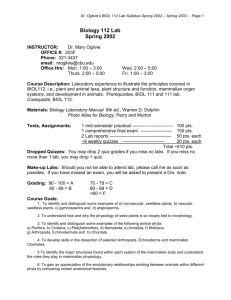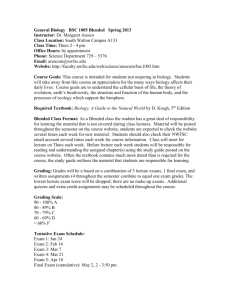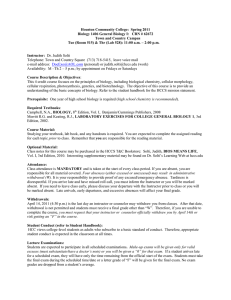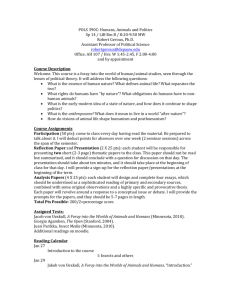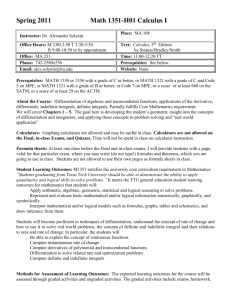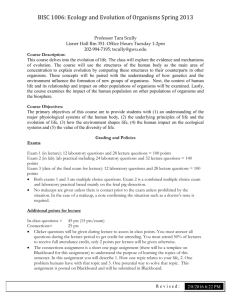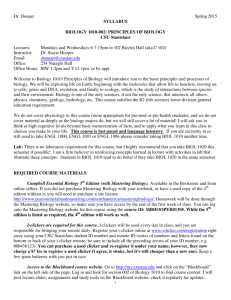BIOL 162 - Heartland Community College
advertisement
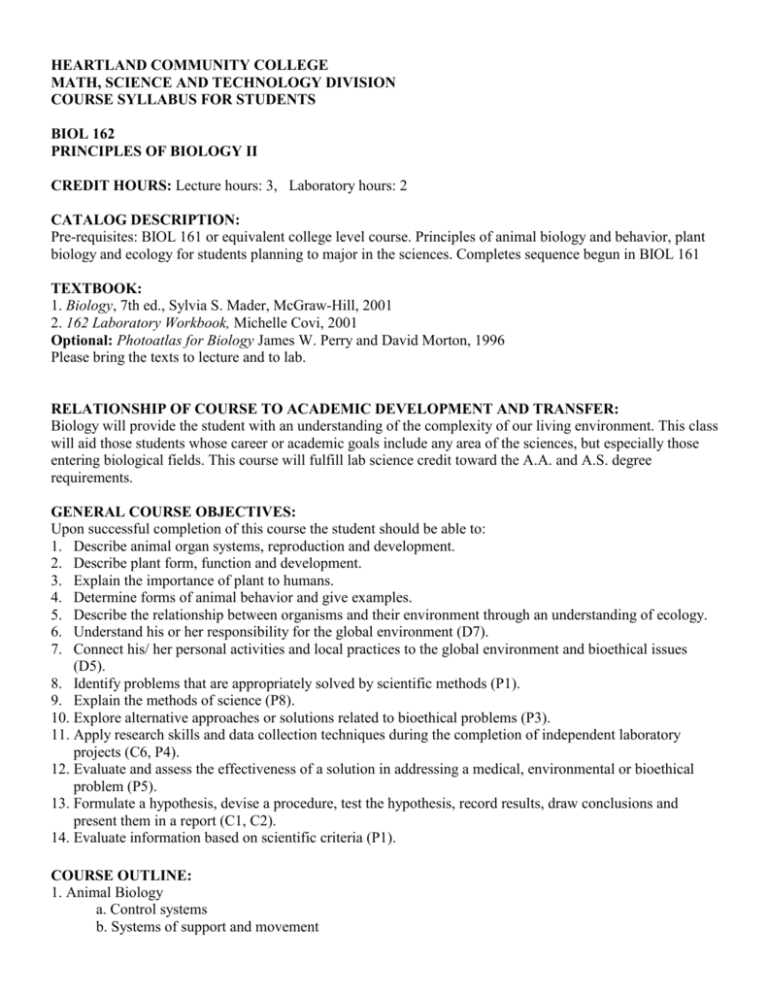
HEARTLAND COMMUNITY COLLEGE MATH, SCIENCE AND TECHNOLOGY DIVISION COURSE SYLLABUS FOR STUDENTS BIOL 162 PRINCIPLES OF BIOLOGY II CREDIT HOURS: Lecture hours: 3, Laboratory hours: 2 CATALOG DESCRIPTION: Pre-requisites: BIOL 161 or equivalent college level course. Principles of animal biology and behavior, plant biology and ecology for students planning to major in the sciences. Completes sequence begun in BIOL 161 TEXTBOOK: 1. Biology, 7th ed., Sylvia S. Mader, McGraw-Hill, 2001 2. 162 Laboratory Workbook, Michelle Covi, 2001 Optional: Photoatlas for Biology James W. Perry and David Morton, 1996 Please bring the texts to lecture and to lab. RELATIONSHIP OF COURSE TO ACADEMIC DEVELOPMENT AND TRANSFER: Biology will provide the student with an understanding of the complexity of our living environment. This class will aid those students whose career or academic goals include any area of the sciences, but especially those entering biological fields. This course will fulfill lab science credit toward the A.A. and A.S. degree requirements. GENERAL COURSE OBJECTIVES: Upon successful completion of this course the student should be able to: 1. Describe animal organ systems, reproduction and development. 2. Describe plant form, function and development. 3. Explain the importance of plant to humans. 4. Determine forms of animal behavior and give examples. 5. Describe the relationship between organisms and their environment through an understanding of ecology. 6. Understand his or her responsibility for the global environment (D7). 7. Connect his/ her personal activities and local practices to the global environment and bioethical issues (D5). 8. Identify problems that are appropriately solved by scientific methods (P1). 9. Explain the methods of science (P8). 10. Explore alternative approaches or solutions related to bioethical problems (P3). 11. Apply research skills and data collection techniques during the completion of independent laboratory projects (C6, P4). 12. Evaluate and assess the effectiveness of a solution in addressing a medical, environmental or bioethical problem (P5). 13. Formulate a hypothesis, devise a procedure, test the hypothesis, record results, draw conclusions and present them in a report (C1, C2). 14. Evaluate information based on scientific criteria (P1). COURSE OUTLINE: 1. Animal Biology a. Control systems b. Systems of support and movement c. Maintenance systems d. Reproduction 2. Plant Biology a. Structure and function b. Life cycles c. Response to the environment 3. Ecology and Behavior a. Populations and communities b. Ecosystems and the global environment c. Behavior d. Bioethics STUDENT EVALUATION: Three- fourths of your grade will be based on the lecture portion of the course and one-fourth will be based on the laboratory. Lecture grades will be on a points-percentage basis using the four best scores from the five exams. If you are absent from one of the first four exams without permission, it will be counted as your lowest score. Lecture exams will be worth 100 points each and will be multiple-choice, matching and short answer questions. An independent project will be worth 100 points and 25 attendance points may be earned. The lab portion of the grade will be based on quizzes (10 pts. each), lab midterm (20 pts.) and lab reports (20 pts. each). One low quiz and report will be dropped. Laboratory points are worth half of lecture points for a course total of 700 pts. The grading scale: 627-700 pts. = 90-100% A 557-626 pts. = 80-89% B 487-556 pts. = 70-79% C 417-486 pts. = 60-69% D 0-416 pts. = 0-59% F Tentative Lecture Schedule Date Topic January 15-29: February 5- 14: Feb. 21- Mar. 5: March 11-15 March 19- April 2: Apr. 9 -May 7: Tissues, Nervous system Senses, Endocrine Musculoskeletal Digestive, Respiratory Circulatory, Immune Urinary Reproduction and Development Spring Break Plant structure and reproduction Plant physiology Populations, Communities Ecosystems, Biomes Animal behavior Chapter 40, 46 47, 49 48 43, 44 41, 42 Evaluation Exam 1: Jan. 31 Exam 2: Feb. 19 45 50, 51 36, 37, 39 38 23, 24 25, 26 22 Exam 3: Mar. 7 Exam 4: Apr. 4 Final Exam: May 14 BIOL 162 LAB SCHEDULE DATE: TOPIC Jan 15 Jan 22 Jan 29 Feb 5 Feb 12 Feb 19 Feb 26 Mar 5 Mar 12 Mar 19 Mar 26 Apr 2 Apr 9 Apr 16 Apr 23 Apr. 30 May 7 Anatomical Terminology/Histology The Nervous System (Q1) The Senses (Q2) The Musculoskeletal System (Q3)- Project topic due The Respiratory System/ The Digestive System (Q4) The Circulatory System (Q5) The Excretory System/The Reproductive System (Q6)- Project Proposal due Lab Midterm BREAK Plant Tissues and Organs Plant Reproduction (Q7) Project Workday (Q8) Population Ecology Community Ecology (Q9) Ecosystems- Field Trip Animal Behavior (Q10) Draft Final Report Due Presentation of Projects –Final Project Report due
